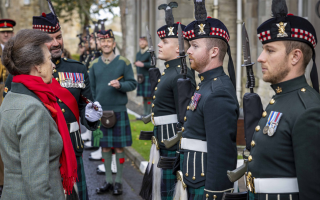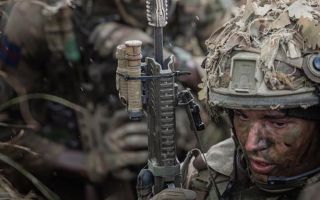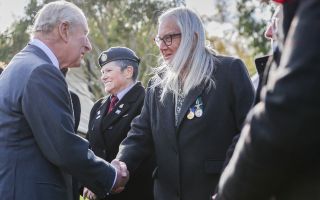Tri-Service
Theresa May Announces New Plan To Protect UK Troops
Theresa May has announced that British troops are to be protected against "vexatious" legal claims arising from future conflicts, by the UK opting out from parts of human rights law.
Under changes being outlined at the Conservative Party conference in Birmingham, the government will hope to take advantage of a right to suspend aspects of the European Convention on Human Rights (ECHR) at times of war.
Mrs May said the move should end an "industry of vexatious claims", which has seen veterans of Iraq and Afghanistan pursued through the courts over alleged mistreatment of combatants and prisoners.
Speaking at the Conservative Party Conference in Birmingham, the Defence Secretary Sir Michael Fallon said:
"Serious claims must be investigated but spurious claims will be stopped, so our Armed Forces can do their jobs fighting the enemy - not the lawyers."
It comes after Public Interest Lawyers, a firm responsible for many of these claims, closed in August.
Describing herself as "not the biggest fan of the EHCR", the Prime Minister said the move would reduce the burden on taxpayers, which has seen the Ministry of Defence spend more than £100 million on Iraq-related investigations, inquiries and compensation since 2004.
Mrs May last month raised concerns over the "industrial scale" of claims lodged with the Iraq Historic Allegations Team (IHAT), which was set up in November 2010 to look into allegations of murder, abuse and torture of Iraqi civilians by UK military personnel between 2003 and 2009.
IHAT has considered claims relating to more than 1,500 individuals, ranging from ill-treatment during detention to assault and death by shooting.
Some 326 cases have been settled, with around £20 million paid out in compensation, but concerns have been raised about service personnel facing investigation even after having been cleared of wrongdoing by criminal courts.
Military advisers have warned that the extension of the Convention's provisions to the battlefield threatens to undermine the operational effectiveness of the Armed Forces.
Tory MP Tom Tugendhat, who served in Iraq, wrote exclusively for Forces TV:
"The same rules cannot apply to someone expecting an enemy attack at any moment and a policeman patrolling a normally peaceful street."
The 1953 European Convention permits signatories to suspend, or "derogate", their obligation to observe certain human rights responsibilities "in time of war or other public emergency threatening the life of the nation".
France took advantage of the procedure in November 2015 during its response to the terror attacks in Paris, while the UK took the same step several times during the Northern Irish Troubles in the 1970s, and was backed by the European Court of Human Rights. Mrs May told Sky News' Sunrise programme:
"Our troops - our men and women in our Armed Forces - go out there and put their lives on the line in order to defend us and... I think they should know that government is on their side", but she added "Of course, if there are credible allegations of criminal behaviour, those need to be investigated, but we need to stop this industry of vexatious claims which has grown up".
The 'derogation' plan, however, only applies to numbers 2 and 5 of the ECHR's 18 Articles (relating to life and liberty/security). Other articles relating to life, torture, and servitude would still apply, as would the Geneva Conventions.
An explanation of the Geneva Conventions, which British troops would still be required to adhere to even if parts of the ECHR were opted out of
Lawyer Jocelyn Cockburn, who brought cases against the Government on behalf of British soldiers over claims of inadequate equipment, has also questioned the move. Speaking on the BBC's Today programme this morning, she said:
"I think it's really important the press don't get led along this line. The statement today is not a new and novel thing that the government will be doing to protect soldiers. There has always been a right to 'derogate' from the convention of human rights at a time of war - a decision could have been taken in Iraq, but it wasn't, and possibly for good reasons".
Ms Cockburn said that the ECHR had been used to establish that equipment provided to British troops during the Iraq war had been inadequate and that the MoD failed to protect the right to life of soldiers.
The move is also being criticised by the National Council for Civil Liberties, who say it would allow the government to cover up its own failings by removing these important protections.
If the proposal were to go ahead, both houses of Parliament would still need to vote in favour of it, and it would not apply retrospectively, i.e. to cases that have already been brought against British troops. Therefore the cases that have prompted the proposed measure would not be affected by it.








